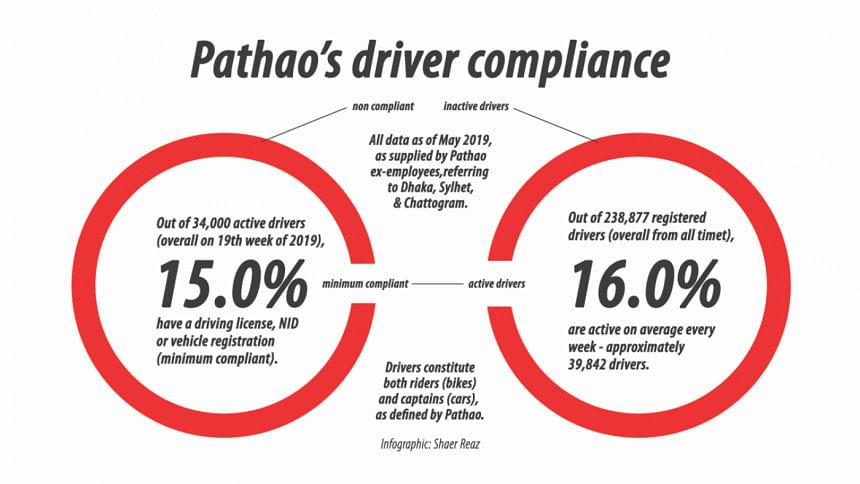Where is Pathao headed?

Dear Sir,
Please accept this letter as formal notification of my resignation from my position in Pathao. As per my appointment letter I am supposed to give at least one month notice to get the full payment, hence my last day at work will be 31 July, 2019.
I am grateful for the opportunity to work here and wish you and the company the very best going forward.
Yours Sincerely,
_______________
Name:
ID:
Point to be noticed, the letter has a blank space where concerned individuals could put in their names and ID numbers. When John Doe* walked into work at the Pathao office in Gulshan last Tuesday morning, he was ushered into a meeting room along with a group of others, and greeted with this letter. A letter that uses the pronoun “I”, but that he did not write. As one by one the employees were made to hand over their company SIM cards, sign the letter, John took a photo of it.
“What was happening here is a violation of the labour law,” said John. He is not wrong—there is no provision for ‘forced resignation’ in the Bangladesh Labour Act 2006. According to the law, there are two ways in which an employment contract can be dissolved—the worker himself/herself can resign willingly with a month’s notice—or the employer can let the worker go. If the employer decides to terminate a worker, then the latter must be given 120 days’ notice (for monthly rated workers), or the wages due for the notice period. There is also the clause that affords the terminated worker 30 days’ worth of wages for every year worked spent at the organisation.
Scores of workers being laid off—often in violation of the labour law—by ready-made garments factories is a common occurrence. But the Bangladeshi corporate world with its takeaway coffee cups and shiny everything is not usually observed laying off hundreds of workers.
But when a local boy’s company, that became a national brand and a solution to unemployment for thousands, cut out 353 people, it came as heartbreak for the laid-off employees. This was the general sentiment of the ex-employees that this correspondent met and spoke with. Sporting low-fade haircuts, smartwatches, Buddha beads, jogger pants and the beginnings of the tiny potbelly that comes with switching to a life sitting at a desk—they were the quintessential urban youth who take entrepreneurship classes in college and dream about start-ups.
“I joined the company because I believed in the cause. We all did,” said one employee who was recently laid off, when meeting with Star Weekend.
“If they had laid us off as per the law, we would have been completely fine. It is a startup, and the job security is lower here, I get it. I would’ve wanted whatever is the best for the company,” said another employee.
“It is alright to not have the funds to keep employees around, but the way they let go of people is wrong. The compensation being offered is not in accordance with the law,” said yet another ex-employee.
Many others did not even know that they were laid off in violation of the law. “Do we have any rights in this situation?” asked one employee.
How did it come to this?
Losing faith
This story has been told many times before, but it is important to be told again—as a reminder of how far the company has come, and to add context to what went wrong. Pathao started as a dream and a handful of bikes to courier parcels around the city. It received seed funding from a US-based venture capital firm called Battery Road Digital that invests in ride-sharing services globally. It soon grew to a Facebook group where friends and patrons were given access to the beta version of the app, and could request rides from a small fleet of bikes. The company was registered in August 2016 and subsequently received their second round of funding work USD 825,000 from Battery Road Digital and another investor called Skycatcher.
There was no looking back from that point onwards. Each year brought bigger investments—until it didn’t, this year.
“When we were being laid off, we were told it is because the company doesn’t have investment and is unable to generate revenue,” said one ex-employee who held a high-level position within Pathao. Other ex-employees mirrored the same comment, all confirming that Pathao is being unable to generate revenue. Just last month a Reuters news article went viral, where Pathao’s chief operating officer put out a call for USD 50 million in funds.
Ex-employees also said that employees were laid off because foreign investors pressurised the company. Not many know that nearly all of Pathao’s shares is owned by a company called Pathao Inc in New York. Only one share worth Tk 100 belongs to the Bangladeshi counterpart, Pathao Ltd, held by its foreperson Hussain M Elius. Compared to that, Pathao Inc holds 3,04,274 shares (also worth Tk 100) as per data submitted to the government in February 2018.
“The Bangladeshi entity of the company is insignificant and I wonder if that played a role in the layoffs,” lamented an ex-employee.
When industry insiders were asked why Pathao is in a cash-crunch, they pointed to the company itself—the beast grew too big to control, they concluded. Winning the trust of their audience has been a challenge the company has been grappling with—and unfortunately, data shows that the customers’ gut feeling is right.
A passenger of Pathao’s ride-hailing service died and the biker was injured when a double-decker bus hit the bike on Airport Road in July last year. Two months later another passenger and biker duo died in a lorry accident in the city. There are many that do not even see the light of the media because people were not killed—just scroll through the Pathao user groups created on Facebook to get a sense of how frequent bike accidents have been.
One can, of course, point out that the other ride-sharing services are not immune to accidents, and that since Pathao is the top-tier bike sharing service, some accidents are bound to happen in a city where lawlessness rules the streets.
But data given to Star Weekend by the organisation’s employees shows that an incredible majority of the drivers registered on the company’s app do not have driving licenses, national identity cards and vehicle registration papers.
At least 76.1 percent of the drivers active on the street do not have any of the above, as per data from May.
All this is according to data given by the company’s teams dealing with rides and compliance. Star Weekend verified that the documents were authentic, by checking the metadata properties of the document as well as cross-checking with multiple former employees. We do not, however, have the figures for May and June.
The percentage is even larger when taking into consideration the entire fleet of registered drivers—93 to 97 percent of all registered drivers do not have at least a driver’s license, NID and vehicle registration paper.
“I myself came across 60 drivers who had nothing but learners’ permits,” claimed an ex-employee who was laid off during the recent development. Many other ex-employees said compliance has been an issue.
Pathao has three tiers for compliance: “Minimum Compliant” where a driver has a driver’s license or NID, and vehicle registration paper; “Business Compliant” where the driver has a driver’s license, NID, vehicle registration paper, insurance paper, tax token and for cars, fitness paper; and “BRTA compliant” where the driver has all of the above and more, so as to be eligible for the BRTA enlistment certificate.
As per the figures, only 0.20 percent of all registered bikers were BRTA compliant, only two percent were business compliant and only five percent were minimum compliant.
Pathao’s figurehead Hussain M Elius was asked about the fleet of drivers who are not even “minimum compliant” but this correspondent was yet to receive a response at the time of going to print.
A project called Project Apollo was deployed by Pathao to increase compliance among drivers, and these are what the project found out: “majority of drivers are not compliant because of proper vehicle documents” and “strong communication strategy is a must here as drivers are less prone to update their documents”.
Pathao is also operating blindsided because of government regulations, said some of its ex-employees. “I registered drivers, but I had no way of checking whether the NID and driver’s license submitted were real, because the government never gave us any access to those databases,” said one ex-employee.

Cornered
While money was drying up, local competition kept growing. Pathao’s employees were laid off just three months after its closest local competitor Shohoz received Series B (i.e. second round) funding from six venture capital firms. Shohoz had received its first seed fund in 2015, the same year as Pathao, but while Pathao kept raising more and growing more for the following two years, Shohoz became a formidable competition only last year, when the company raised USD 15 million. Suddenly Shohoz’s logo kept popping up everywhere—but most popularly on bike helmets, following the Road Safety movement.
Pathao’s marketing expenditure for the last few months shows that it was feeling the heat. “Among the new (Uber Eats) and existing competitors (Uber, Shohoz, Foodpanda) we are not being able to stand out as the top trusted and beloved brand among all the campaign clutters,” a company document given to Star Weekend states.
Data provided by employees from within the organisation, shows massive expenditures on marketing and PR—between May and June, the marketing department spent Tk 13.8 million. A major percentage of this consisted of media buying. This was just in the weeks preceding this mass firing.
Many of the campaigns directly led to customers taking more trips. But some like the campaign called “#EkShatheMovingBangladesh” was just money down the drain. “No significant change in average trip detected during campaign timeline,” the company observed in a document.
There were many campaigns that were simply meant for visibility, with no immediate return in the form of people using Pathao more. For example, during Ekushey Boi Mela, Pathao published “Ogrojatrar Ogrodut 2” using Tk 1,97,000. During the same month, they pasted stickers on Toma taxis for Tk 2,50,000. Between May to June, the company also spent approximately Tk 5 lakh on a campaign called “Every Ride Matters”. The most expensive spending was branding Gulshan Society rickshaws—approximately Tk 10 lakh was spent on this.
Their marketing budget has always been big—in April, it was Tk 9.19 million, in February it was Tk 9.3 million and in January it was Tk 25 million. We did not have data for March.
“The amount of money they were pouring into these sections—we never realised that the company could be going through a cash crunch. We hosted six iftars during Ramadan!” expressed a current employee. During one of those iftars, which cost Tk 3.7 lakhs, only 83 of 500 people invited showed up, according to company documents.
While most industry bigwigs contacted refused to be quoted for this report, one social entrepreneur called Waliullah Bhuiyan wrote an article on Linkedin.
“Your Marketing can kill you,” he wrote. “I was surprised to see Pathao TVC when it came out first. I couldn’t find any reason why Pathao should have a TV ad. Those who live in Dhaka knows about Pathao. Those who own a bike knows about Pathao. The money could be spent wisely. Being a tech company, Pathao knows nobody watches TV, especially their target audience. So what was the point?” The television commercial, featuring national cricket team captain Mashrafe Bin Mortaza, is one of the items under Pathao’s media and TVC buying, which made up 57.7 percent of the Tk 13.8 million spent during May to June 15, 2019.
Too big to control?
When it first came to public wavelengths that the company was laying off 353 workers—the first question that came to many of our minds was, “how many employees do they have?” As put by some employees we spoke to, at the beginning of 2019, the company had around 1,500 employees (both permanent and contractual) excluding the riders.
Many of them were hired around 2017, the ex-employees said, with the company having at least 900 employees by the end of that year. The employees and industry insiders also questioned how Pathao hired so many people if funds were not in the pipeline.
“The heads of the teams hired as they wished,” several former employees alleged, “whether we needed people or not.”
“I didn’t know Pathao had such a big team,” wrote Waliullah Bhuiyan in his Linkedin article. “Keep in mind, most of the growth companies died because of hiring - or wrong strategy of hiring. Startups die because they run out of money, and the biggest cost is the human resource. Hire only if necessary or you can afford them with the existing runway. I think with $10 m investment, Pathao hired too many people assuming that they are going to raise another round after a certain time. When they couldn’t, they realized they need a longer runway and firing employees was the quickest way to increase that runway.”
But a company that was slated to “disrupt” the traditional modes of doing business, ended up disrupting the industry in a way even they had not wanted.










Comments